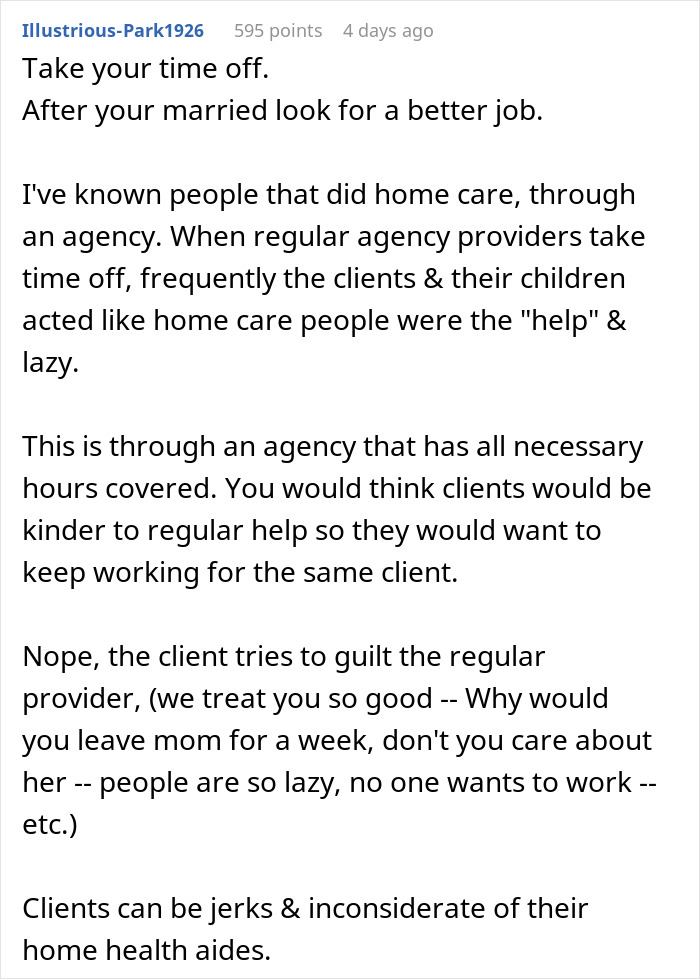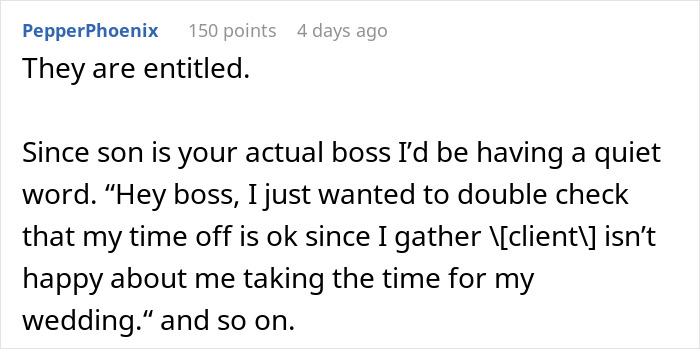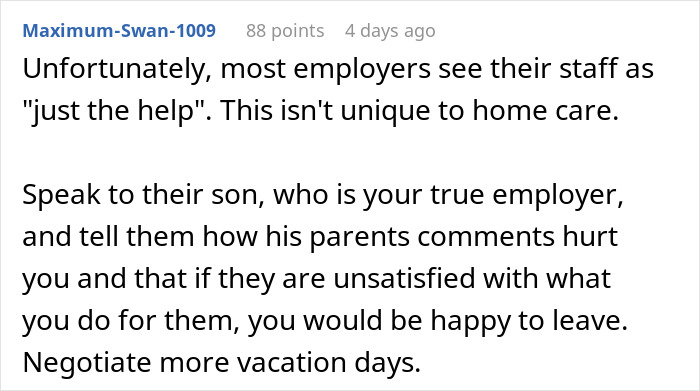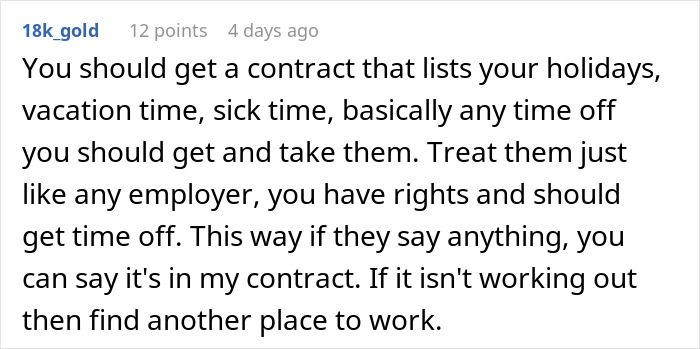Everybody deserves to get time off for all of their hard work. There’s no question about it! However, depending on where you live, what company or client you work with, and what your contract states, getting some (un)paid time off can be harder than you think.
The sad reality is that some employers think that taking time off is tantamount to laziness, which could not be further from the truth. Redditor u/DomiBlushes1998, who cares for two elderly people, recently turned to the r/EntitledPeople subreddit for advice on handling a delicate situation. She shared how she’s getting married, but her entitled employers think she doesn’t ‘deserve’ time off. Scroll down for the full story.
Bored Panda got in touch with the author of the story, u/DomiBlushes1998, and she was kind enough to answer our questions about what happened. You’ll find our full interview with her as you read on. “The people I work for are at an age where they’ve stopped being polite, they’re done, it’s their time to relax and enjoy life. They’re not unkind on purpose, they just seem to be past the point of societal politeness.”
Every single employee deserves time off to rest, recuperate, and enjoy their life

Image credits: Rawpixel/Envato elements (not the actual photo)
One woman, who is planning on getting married, asked the internet for advice after sharing her employers’ negative attitude toward time off
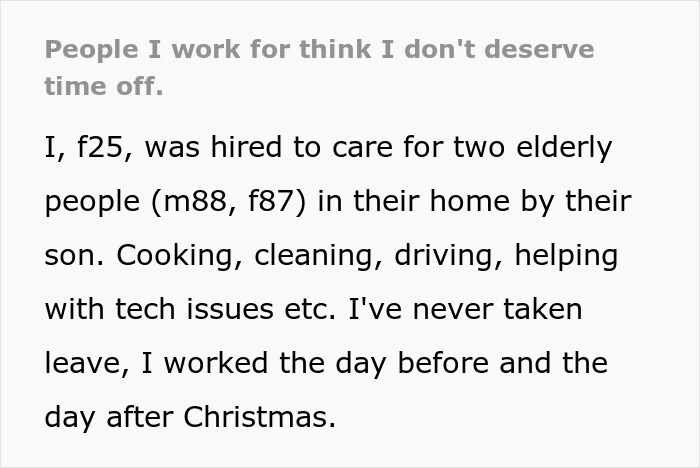



Image credits: YuriArcursPeopleimages/Envato elements (not the actual photo)
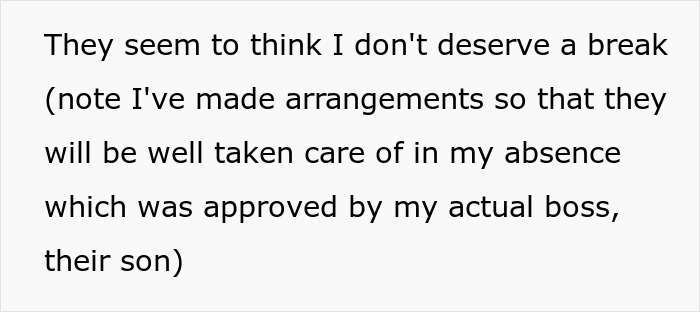

Image credits: DomiBlushes1998
“It was a cold reminder that I am just an employee at the end of the day, and I need to remember that”

Image credits: Gantas Vaičiulėnas/Pexels (not the actual photo)
Bored Panda wanted to get to grips with what happened in more detail. We asked the author what her initial reaction was when she realized that her employers didn’t want her to take those few days off.
“Honestly, I wasn’t surprised, but I was a bit hurt,” u/DomiBlushes1998 opened up to us.
“I spend my whole day with these two people, and it’s hard not to start to care for them on a personal level. It was a cold reminder that I am just an employee at the end of the day, and I need to remember that.”
We were curious to get the OP’s take on why her employers were so reluctant to give her the time off in the first place. “I think they just sort of see me as permanently here, they’re used to having someone in the house all day who can do things for them at a moment’s notice,” u/DomiBlushes1998 shared her perspective on the situation with Bored Panda.
“I’m basically part of the furniture at this point,” she said, adding that she very much doubts that their feelings and actions toward her will change. “They’re at an age where they’re just so set in their ways.”
Meanwhile, u/DomiBlushes1998 shared some advice with anyone who’s feeling a tad overwhelmed in the run-up to their own wedding. She said that it is vital to choose your partner very carefully. “Coming home to him makes it all worth it,” she said.
Meanwhile, she added that a long hot bath, pizza, and wine can help deal with all the stress that comes with organizing the wedding itself. Self-care is very important!
Your situation with taking time off will depend on where you live and what your contract looks like

Image credits: Edmond Dantès/Pexels (not the actual photo)
Regarding taking time off, a lot really does depend on what part of the world you live in. For instance, the United States has no federally mandated paid time off. What this means is that it’s up to the discretion of your boss to provide it, meaning you have to read your contract very carefully before signing it.
Across the Atlantic, in the European Union, all employees are entitled to at least 4 weeks of paid vacation. That’s on top of any holidays.
However, if you’re a freelancer, things can get muddier. Everything then rests on the type of agreement you’ve made with your client and what’s stated in your contract.
Legal documents aside, it would be the ethical thing to do to allow your employee to take time off. Especially to get married!
Redditor u/DomiBlushes1998 pointed out that she let her clients know about this beforehand. Not only that, but she also managed to find a replacement for her services.
Given all of that, it would be ridiculous not to grant the leave. Not to mention, frankly, how rude it is to talk about someone not ‘deserving’ time off.
It’s absolutely vital for your health to have a good work-life balance

Image credits: Andrea Piacquadio/Pexels (not the actual photo)
It comes down to each and every one of us to enforce the types of boundaries we’re comfortable with at work. If someone repeatedly keeps stepping over boundaries, it’s important that they understand how it’s affecting you.
Many (if not most) people are reasonable and likely to look for some sort of compromise if you bring up a work issue in a diplomatic way. However, if they’re completely inflexible, you may want to consider looking for other clients who have a better understanding of what mutual respect looks like.
If you work at a company as a salaried employee, however, you have some more options. If you have trouble getting time off, you can talk to your human resources representatives. You can reach out to your supervisor’s boss (or their boss!). You can talk to your union rep.
The important thing here is to stay as calm, cool, and collected as possible. Learn your rights. Know what your contract entails. Meanwhile, document proof that someone is refusing to give you time off. This way, you’ll avoid a ‘I said/they said’ situation.
That being said, keep in mind that some companies have toxic hustle cultures where overtime and overwork are the way they conduct things. Taking time off there and having a work-life balance are seen as ‘weaknesses.’ In those cases, it’s best to consider whether the pay and benefits are worth the constant stress and exhaustion.
One study by the World Health Organization and the International Labour Organization found that working more than 55 hours a week can have negative effects on your health. Specifically, you have a greater risk of developing coronary artery disease, stroke, and recurring chest pain.
The author shared a few more thoughts in the comments

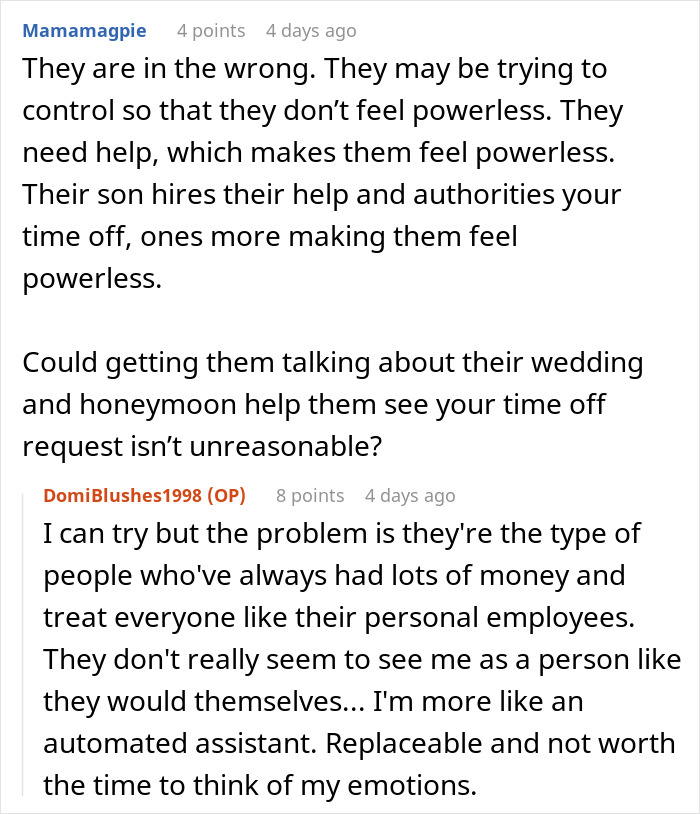

Lots of internet users wanted to share some practical advice with the woman
